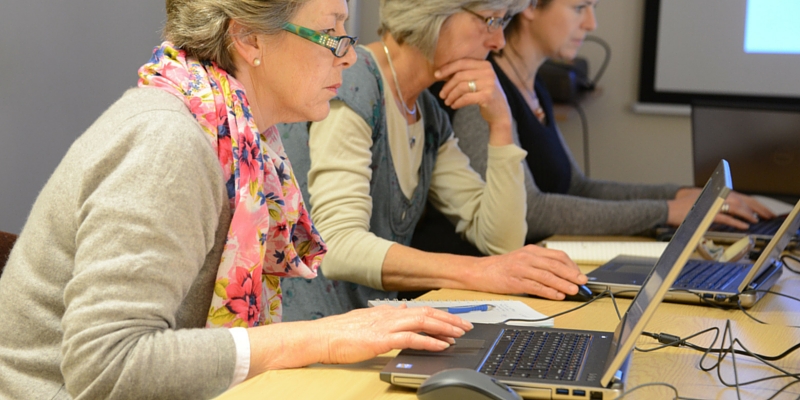The case for Digital Leadership has never been stronger.
Here at Cosmic we’ve been working on digital inclusion projects for close to 20 years – in fact we’re celebrating that milestone this autumn. And during that time we have been privileged to work across the South West, and sometimes further afield, bringing new digital skills and learning to thousands of people, organisations and businesses. We’ve worked with some of the most digitally disadvantaged people, all ages, all sectors and across urban and rural areas too. All of this means we’ve got a major level of experience of how big the impact is on lives, businesses and communities which embrace digital technologies for learning, self-development and economic advantage.

Most recent research shows that less than 10% of the population are now considered to be digitally excluded on a regular basis. So there’s still work to do, but there has also been such major progress over the years.
And so, a reflection during a recent team discussion went along the lines of – ‘well if all these people now know more about digital and are engaged in it on a regular basis, no wonder their expectations are rapidly increasing’ …. ‘and no wonder they expect people in positions of power to know as much (if not more) about digital’.
So, Pandora’s Box is well and truly opened when it comes to the digital revolution, and it’s now up to our leaders and senior managers to rise up to the challenges.
Our attention is turning to those people in decision-making roles and in charge of delivering services, products and programmes for business, organisations and communities. This includes large, corporate businesses but also our public sector organisations, charities and voluntary sector. Everyone in a position of leadership and influence, particularly those making major decisions must have a grasp of the key digital technologies and the trends for the years ahead which will impact on those decisions.
Still not convinced? … well here’s more to think about:
The young people entering the workforce this year and from now on will be our ‘millennials”. A whole generation which was born and has grown up in the digital age. They no longer have the issues of working out how to migrate things from ‘analogue’ to digital; in fact they generally have a different attitude altogether, seeing digital as a means-to-an-end rather than the end itself. They are generally agnostic about suppliers, brands, platforms and will migrate quickly from one-to-another when it offers best experience. They’ve become the agile in their mind-sets, and this will need to be embraced by business practices too. However, this doesn’t mean that they are all digital whizzkids either. They will still need to understand how our businesses are run and operate, and most importantly they will need to understand the importance of customer service and high quality delivery.

Need more convincing still? … well then:
Connectivity which has for over 20 years been a major challenge across the country, region and certainly for our rural areas continues to pose major infrastructure issues. But things are progressing more rapidly than ever now and the current government commitment is for 100% of premises to have access to superfast connections by 2020. And at the same time the growth in urban areas of 4G, Wi-Fi and maybe 5G over the coming years means we won’t even think about connections when we travel around our major towns and cities – it will just happen. In the years ahead we will look back on these years and smile at the old-style attitudes to having a good connection in place – we will instead just expect it to be there. In a world where connectivity is no longer a barrier our businesses and organisations would be mad to ignore it. We can be certain the customers of our businesses won’t be ignoring it at all.
Now plenty of work has already been developed and delivered by a wide range of organisations. Our colleges and universities are already addressing the call from businesses to provide a strong supply of work-ready employees of the future, who all understand how digital can be used for productivity gains and competitive advantage. And globally there are increasing opportunities for skills and understanding to be developed and enhanced, not least on the internet itself (mainly courtesy of YouTube!) But more can still be done – for example at school level we need to support our teachers to embrace the digital technologies which will make learning fun and increase attainment levels. This is a major ambition and holds such promise for a future where children will have a personalised approach to learning driven by digital platforms and devices, and where their teachers can focus on adding value and experience to that learning.
And more can be done in all businesses and in all sectors. Take a pause to reflect on your current business plan, and how well it has been designed to make the most of digital developments and how agile it will be when big innovations come along. We’re fairly confident you’ll have something in your mind about ways in which future opportunities and risks need to be addressed.
Perhaps the biggest of all challenges faces our public sector services – local government, health, and many more. Organisations which focus is on people and communities they serve, and whose ability to innovate and invest in skills has been severely hampered during many years of cut-backs. But it is these services which need the best of digital leadership in the future so that all of us can benefit from great services and lower costs.
We need digital leaders developing innovations and ‘leap-frog’ moments across all services and all areas. And in discussions with public sector partners, we’ve commonly heard that there is a major ‘fear factor’ about digital; namely that it will lead to job losses and therefore is regarded as a negative issue. How wrong then that staff in our public services are not being supported and influenced by leaders who know that the real promise of digital transformation is that we can rely on digital devices and platforms to take away the drudgery of admin and process, and help them to focus on delivery of high quality support for the people they serve. Take away the endless paperwork and desk-time and free them up to be with people – be more human and less computer!
For more details on the need for improved Digital Leadership – please read our recently published White Paper which you can access here.
Sign up now to one of Cosmic’s Digital Leadership taster courses running this year – more details here.
